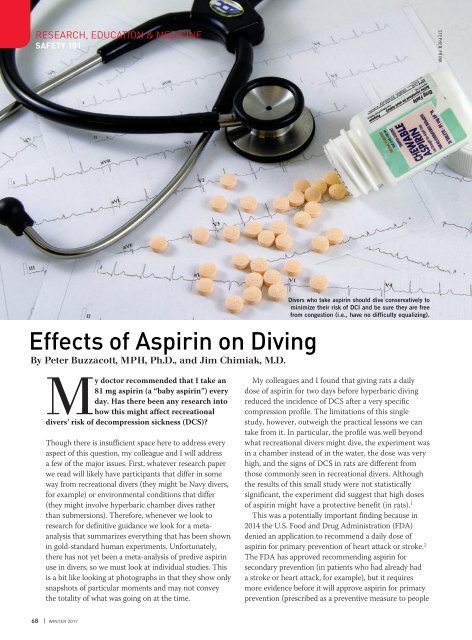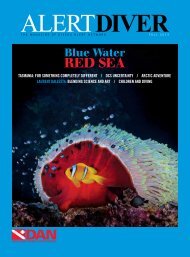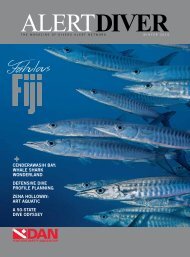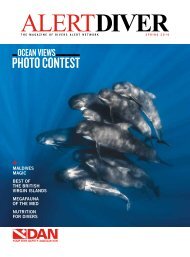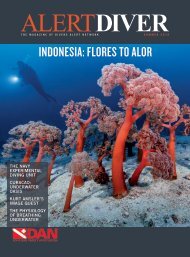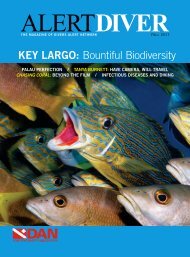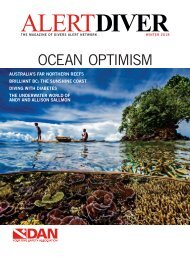AD 2017 Q1
Alert Diver is the dive industry’s leading publication. Featuring DAN’s core content of dive safety, research, education and medical information, each issue is a must-read reference, archived and shared by passionate scuba enthusiasts. In addition, Alert Diver showcases fascinating dive destinations and marine environmental topics through images from the world’s greatest underwater photographers and stories from the most experienced and eloquent dive journalists in the business.
Alert Diver is the dive industry’s leading publication. Featuring DAN’s core content of dive safety, research, education and medical information, each issue is a must-read reference, archived and shared by passionate scuba enthusiasts. In addition, Alert Diver showcases fascinating dive destinations and marine environmental topics through images from the world’s greatest underwater photographers and stories from the most experienced and eloquent dive journalists in the business.
You also want an ePaper? Increase the reach of your titles
YUMPU automatically turns print PDFs into web optimized ePapers that Google loves.
RESEARCH, EDUCATION & MEDICINE<br />
SAFETY 101<br />
STEPHEN FRINK<br />
Effects of Aspirin on Diving<br />
By Peter Buzzacott, MPH, Ph.D., and Jim Chimiak, M.D.<br />
Divers who take aspirin should dive conservatively to<br />
minimize their risk of DCI and be sure they are free<br />
from congestion (i.e., have no difficulty equalizing).<br />
My doctor recommended that I take an<br />
81 mg aspirin (a “baby aspirin”) every<br />
day. Has there been any research into<br />
how this might affect recreational<br />
divers’ risk of decompression sickness (DCS)?<br />
Though there is insufficient space here to address every<br />
aspect of this question, my colleague and I will address<br />
a few of the major issues. First, whatever research paper<br />
we read will likely have participants that differ in some<br />
way from recreational divers (they might be Navy divers,<br />
for example) or environmental conditions that differ<br />
(they might involve hyperbaric chamber dives rather<br />
than submersions). Therefore, whenever we look to<br />
research for definitive guidance we look for a metaanalysis<br />
that summarizes everything that has been shown<br />
in gold-standard human experiments. Unfortunately,<br />
there has not yet been a meta-analysis of predive aspirin<br />
use in divers, so we must look at individual studies. This<br />
is a bit like looking at photographs in that they show only<br />
snapshots of particular moments and may not convey<br />
the totality of what was going on at the time.<br />
My colleagues and I found that giving rats a daily<br />
dose of aspirin for two days before hyperbaric diving<br />
reduced the incidence of DCS after a very specific<br />
compression profile. The limitations of this single<br />
study, however, outweigh the practical lessons we can<br />
take from it. In particular, the profile was well beyond<br />
what recreational divers might dive, the experiment was<br />
in a chamber instead of in the water, the dose was very<br />
high, and the signs of DCS in rats are different from<br />
those commonly seen in recreational divers. Although<br />
the results of this small study were not statistically<br />
significant, the experiment did suggest that high doses<br />
of aspirin might have a protective benefit (in rats). 1<br />
This was a potentially important finding because in<br />
2014 the U.S. Food and Drug Administration (FDA)<br />
denied an application to recommend a daily dose of<br />
aspirin for primary prevention of heart attack or stroke. 2<br />
The FDA has approved recommending aspirin for<br />
secondary prevention (in patients who had already had<br />
a stroke or heart attack, for example), but it requires<br />
more evidence before it will approve aspirin for primary<br />
prevention (prescribed as a preventive measure to people<br />
68 | WINTER <strong>2017</strong>


